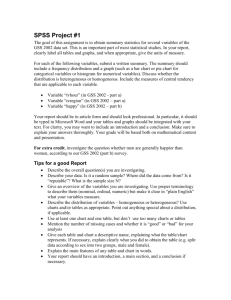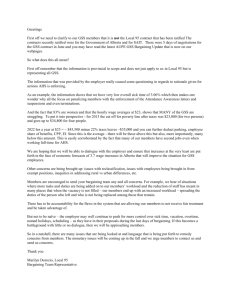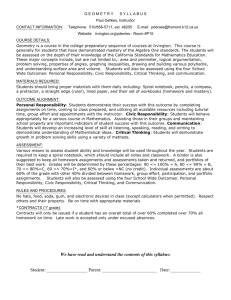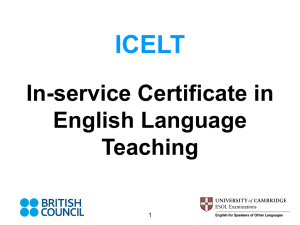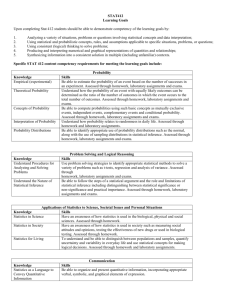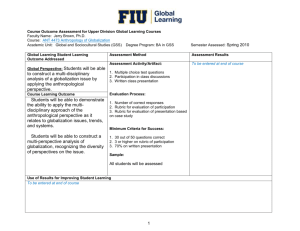Assessment Results - FIU Global Learning
advertisement
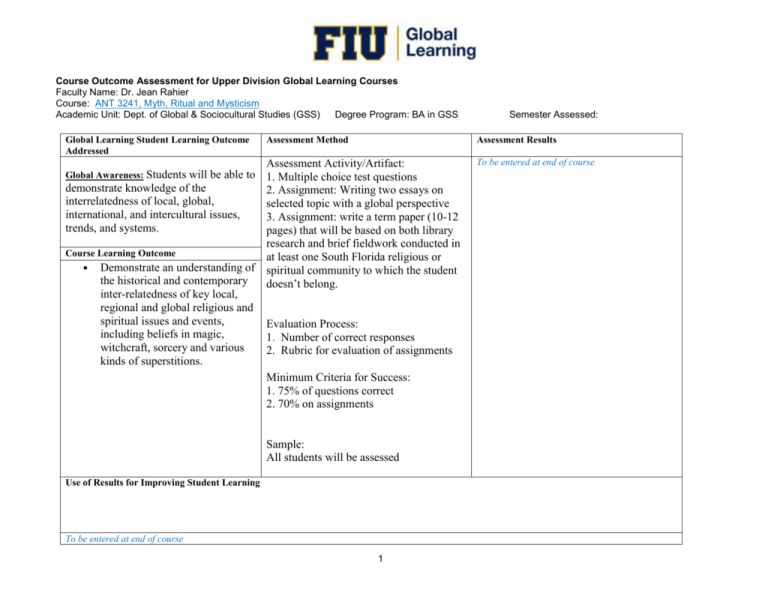
Course Outcome Assessment for Upper Division Global Learning Courses Faculty Name: Dr. Jean Rahier Course: ANT 3241, Myth, Ritual and Mysticism Academic Unit: Dept. of Global & Sociocultural Studies (GSS) Degree Program: BA in GSS Global Learning Student Learning Outcome Addressed Assessment Method Semester Assessed: Assessment Results Assessment Activity/Artifact: 1. Multiple choice test questions 2. Assignment: Writing two essays on selected topic with a global perspective 3. Assignment: write a term paper (10-12 pages) that will be based on both library research and brief fieldwork conducted in Course Learning Outcome at least one South Florida religious or • Demonstrate an understanding of spiritual community to which the student the historical and contemporary doesn’t belong. inter-relatedness of key local, regional and global religious and spiritual issues and events, Evaluation Process: including beliefs in magic, 1. Number of correct responses witchcraft, sorcery and various 2. Rubric for evaluation of assignments kinds of superstitions. Minimum Criteria for Success: 1. 75% of questions correct 2. 70% on assignments Global Awareness: Students will be able to demonstrate knowledge of the interrelatedness of local, global, international, and intercultural issues, trends, and systems. Sample: All students will be assessed Use of Results for Improving Student Learning To be entered at end of course 1 To be entered at end of course Course Outcome Assessment for Upper Division Global Learning Courses Faculty Name: Dr. Jean Rahier Course: ANT 3241, Myth, Ritual and Mysticism Academic Unit: Dept. of Global & Sociocultural Studies (GSS) Degree Program: BA in GSS Global Learning Student Learning Outcome Addressed Global Perspective: Students will be able to conduct a multi-perspective analysis of local, global, international, and intercultural problems. Course Learning Outcome Demonstrate a comprehension of various perspectives associated with different culturally-based conceptualizations of the supernatural world and their attendant practices and rituals, which can also be linked to different geographic locations on the global stage. Semester Assessed: Assessment Method Assessment Results Assessment Activity/Artifact: 1. Multiple choice test questions 2. Assignment: Writing two essays on selected topic with a global perspective 3. Assignment: write a term paper (10-12 pages) that will be based on both library research and brief fieldwork conducted in at least one South Florida religious or spiritual community to which the student doesn’t belong. To be entered at end of course Evaluation Process: 1. Number of correct responses 2. Rubric for evaluation of assignments Minimum Criteria for Success: 1. 75% of questions correct 2. 70% on assignments Sample: All students will be assessed Use of Results for Improving Student Learning To be entered at end of course 2 Course Outcome Assessment for Upper Division Global Learning Courses Faculty Name: Dr. Jean Rahier Course: ANT 3241, Myth, Ritual and Mysticism Academic Unit: Dept. of Global & Sociocultural Studies (GSS) Degree Program: BA in GSS Global Learning Student Learning Outcome Addressed Global Engagement: Students will be able to demonstrate willingness to engage in local, global, international, and intercultural problem solving. Course Learning Outcome Students will be able to—willingly— better engage in a number of problem solving activities in a variety of sociocultural contexts around the globe. Semester Assessed: Assessment Method Assessment Results Assessment Activity/Artifact: 1. Multiple choice test questions 2. Assignment: Writing two essays on selected topic with a global perspective 3. Assignment: write a term paper (10-12 pages) that will be based on both library research and brief fieldwork conducted in at least one South Florida religious or spiritual community to which the student doesn’t belong. To be entered at end of course Evaluation Process: 1. Number of correct responses 2. Rubric for evaluation of assignments Minimum Criteria for Success: 1. 75% of questions correct 2. 70% on assignments Sample: All students will be assessed Use of Results for Improving Student Learning To be entered at end of course 3
